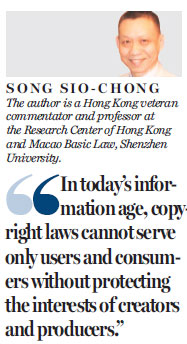A more rational approach to copyright bill urgently needed
Updated: 2016-02-22 08:39
By Song Sio-chong(HK Edition)
|
|||||||||
Overwhelmed by continuous calls for a quorum and endless filibustering, the Legislative Council did not pass the long-awaited Copyright (Amendment) Bill 2014 before the end of the Year of the Sheep. "Pan-democrats" stood firm on their demands to amend the bill in several ways, for instance, prohibiting the practice of "contract override".
In fact, it is doubtful whether all the "pan-democratic" legislators advocating such a change really understand this principle - not to mention the public.
"Contract override" is said to be the "practice of parties entering into contractual agreements which exclude or limit the operation of certain statutory copyright exceptions". In other words, the parties involved in a contract may decide, by mutual consent, what copyright exceptions to apply or not to apply under specific circumstances. Examples of these exceptions include parody, caricature, pastiche, criticism, comment, news reporting, teaching and scholarship. If "contract override" is banned, parties will absolutely follow each statutory copyright exception under all circumstances with no room for negotiation.
Few common law countries have precluded the application of "contract override" in relation to copyright law, but the UK is one which has done this. Section 30A of the Copyright, Designs and Patents Act 1988 of the UK says: "To the extent that a term of a contract purports to prevent or restrict the doing of any act which, by virtue of this section, would not infringe copyright, that term is unenforceable."
Some "pan-democrats" want Hong Kong to adopt such a prohibition simply because Britain has. But this argument is rather weak: First, the ban was added to the British act in 2014 in the wake of a number of controversial issues. Its impact is yet to be seen. Such an argument is neither binding nor particularly persuasive for Hong Kong. Second, despite the British legislation, one can always name a longer list of common law jurisdictions which have not done this. As countries with well-developed intellectual property laws, the US and Australia have not banned "contract override". Instead of blindly following the UK, Hong Kong must make a choice based on its own needs to balance the interests of different stakeholders.
The "pan-democrats" were also wrong in equating the copyright bill with the Minimum Wage Ordinance or the Disabilities Ordinance. These two do not allow contractual wages below the statutory minimum level in order to stop exploitation of workers and to safeguard human dignity. Such a statutory protection should prevail; copyright law, however, concerns property or quasi-property rights which require relatively less robust legal protection.
I believe that maintaining the "contract override" principle and rejecting the proposal of the "pan-democrats" will bring more benefits to Hong Kong, without causing undue harm to our overly worried population of netizens.
"Contract override" provides commercial flexibility to both copyright holders and people who engage with the former. Business efficiency demands certain rights and freedoms to be contracted out; freedom of expression is no exception. For instance, in a business transaction where trade secrets are involved, the parties would probably sign a non-disclosure agreement (NDA), promising not to exercise their freedom of expression for business secrets. Similarly, parties in a copyright transaction can agree not to exercise certain statutory rights. With "contract override", it is up to the parties to negotiate their contracts to ensure flexibility. If any contracts were procured by unethical means, the normal clauses under Hong Kong contract law (such as economic duress and unconscionability) would apply.
By upholding the sanctity of the contract, Hong Kong will remain competitive in copyright protection, to encourage more creative works to be developed, commercialized and protected. Society will in turn benefit from the increased availability and presence of high-quality creative works.
To ease some netizens' concerns about "contract override", the government should reassure them both legally and practically. On one hand, the doctrine of privity applies in Hong Kong, meaning that a third party to a contract cannot sue or be sued based upon that contract. Netizens will not be affected unless they are parties to a contract with the copyright holders. On the other hand, copyright holders seldom target individual consumers for litigation due to the high costs and uncertain benefits. Individual users, particularly online users, are difficult to identify. Even if a copyright holder has started an action against them, they tend to target big corporations, rather than individual users.
In conclusion, in today's information age, copyright laws cannot serve only users and consumers without protecting the interests of creators and producers. In the Year of the Monkey, the "pan-democrats" must stop being selfish. They should consider the interests of different stakeholders as well as those of Hong Kong as a whole; otherwise Hong Kong people will suffer for their irrational behavior and stupidity.

(HK Edition 02/22/2016 page9)